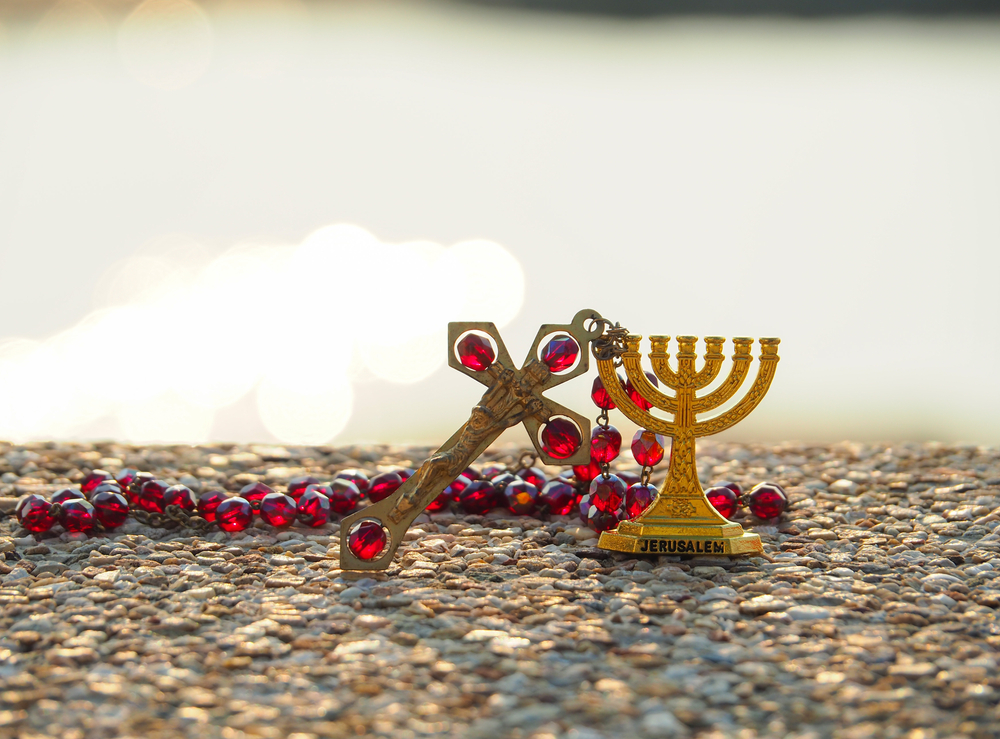
Of the major Abrahamic religions, Christianity and Judaism would appear to be the two most closely aligned. The Tanakh, or the Hebrew Bible, includes the Torah, which contains the first five books of the Old Testament (Genesis, Exodus, Leviticus, Numbers and Deuteronomy). Many leading Biblical figures such as Abraham and Moses are important to both faiths. In fact, the major distinction between the two religions is a belief or nonbelief in Jesus Christ as a divine Messiah. Messianic Judaism is a new religious movement that combines elements of Judaism with Evangelical Christianity.
What Is Messianic Judaism?
Messianic Judaism is what is known as a syncretic religion, a mixture of other faiths or schools of thoughts. Messianic Judaism arose in the mid to late 1900s from the Hebrew Christian movement and a Baptist movement known as Jews for Jesus. The former refers to Jews who converted to Christianity in the 1800s and early 1900s and who had worship communities separate from other denominations, while the latter was an organization dedicated to evangelizing to Jews. Adherents of this faith believe that salvation is achieved only through a personal belief and acceptance of Jesus as a Savior, not Jewish law.
What Are Some of the Defining Views of This Faith?
As a blend of Judaism, Jewish traditions and Christianity, many of the tenets and practices of Messianic Judaism will be familiar to anyone with knowledge of its parent faiths. Below are some of the key points of this modern religious movement:
- God: To adherents, God is benevolent, eternal, omnipotent, omnipresent and omniscient, existing outside of time and space. There is some variance in views on God existing as a Trinity made up of the Father, Son, and Holy Spirit.
- Jesus: While Messianic Jews agree that Jesus was a messiah, not all agree that he was divine.
- Religious texts: The Tanakh and the New Testament are authoritative texts that shape and inform the faith. Followers believe that the Torah is the inspired Word of God and that Jesus taught and affirmed this while on Earth.
- Israel: Followers of this faith believe that the Children of Israel are central to God’s plan. Generally, they don’t believe in replacement theology, which suggests that the original covenant God made with the Jews was superseded by a new covenant of Jesus Christ. This new covenant replaces the Children of Israel with the Christian Church in God’s plan.
- End Times: Most Messianic Jews’ views are like that of most Protestant views, including a Second Coming of Jesus as the Messiah.
Within the faith, there is a significant difference in views about the importance of Jewish oral law. Many believe that it doesn’t supersede the law as defined in the first five books of the Bible and reaffirmed through the teachings of Jesus.
When it comes to sin, some Messianic Jews consider sin to be violation of the law as defined in the Torah, including the concept of original sin. Some believe that atonement is possible through prayer and repentance, especially on Yom Kippur, the Jewish Day of Atonement. Others believe that all sinful acts, committed or uncommitted, are covered through the death and resurrection of Jesus Christ.
How Are Messianic Jews Viewed?
Messianic Jews consider themselves to be a sect of Judaism. This is reflected by the fact that they refer to themselves as believers and Jews, as opposed to converts and Christians. Many Jewish organizations reject this view and consider Messianic Jews to be a form of Christianity, as do many Evangelical Christian groups. There are an estimated 350,000 adherents worldwide, with as many 250,000 in the United States and 20,000 in Israel.
Messianic Judaism is yet another facet in the many churches, denominations and sects that fall under Judaism and Christianity. As with other new religious movements, it’s a syncretic faith made from elements of older belief systems.

